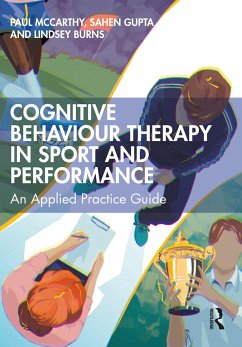
Training and Supervision in Sport and Exercise Psychology
Versandkostenfrei!
Versandfertig in 6-10 Tagen
41,99 €
inkl. MwSt.
Weitere Ausgaben:

PAYBACK Punkte
21 °P sammeln!
Training and Supervision in Sport and Exercise Psychology presents a labyrinth of choices and challenges for trainees and supervisors, such as training and supervision mixing the science of doing sport and exercise psychology with the art of judgement and decision-making to deliver services to athletes. With a multitude of skills to master and competencies to gain, trainees and supervisors need assurances about best practice in their field and the assessments they can trust.Including cases, trainee autobiographical cases, and examples of good practice drawn from current and ex-trainees who hav...
Training and Supervision in Sport and Exercise Psychology presents a labyrinth of choices and challenges for trainees and supervisors, such as training and supervision mixing the science of doing sport and exercise psychology with the art of judgement and decision-making to deliver services to athletes. With a multitude of skills to master and competencies to gain, trainees and supervisors need assurances about best practice in their field and the assessments they can trust.
Including cases, trainee autobiographical cases, and examples of good practice drawn from current and ex-trainees who have become sport psychology consultants, this book aims to educate trainees how to deal competently with professional and ethical guidelines. We aim to educate trainees to get started in service delivery, set up placement, work with clients, use supervision effectively, conduct academic research, and write sound assessments before preparing for a viva voce and beginning the transition to the workplace. This book shall serve trainees and their supervisors on their journey through to qualified status.
Training and supervision to become a sport and exercise psychologist is of the utmost importance in the growing profession of sport and exercise psychology. This book aims to bring clarity, guidance, and support to learning and mastering professional skills in applied sport psychology service delivery. This book is key reading for undergraduates and postgraduates studying sport and exercise psychology and those studying for taught and professional doctorates in sport and exercise psychology.
Including cases, trainee autobiographical cases, and examples of good practice drawn from current and ex-trainees who have become sport psychology consultants, this book aims to educate trainees how to deal competently with professional and ethical guidelines. We aim to educate trainees to get started in service delivery, set up placement, work with clients, use supervision effectively, conduct academic research, and write sound assessments before preparing for a viva voce and beginning the transition to the workplace. This book shall serve trainees and their supervisors on their journey through to qualified status.
Training and supervision to become a sport and exercise psychologist is of the utmost importance in the growing profession of sport and exercise psychology. This book aims to bring clarity, guidance, and support to learning and mastering professional skills in applied sport psychology service delivery. This book is key reading for undergraduates and postgraduates studying sport and exercise psychology and those studying for taught and professional doctorates in sport and exercise psychology.














